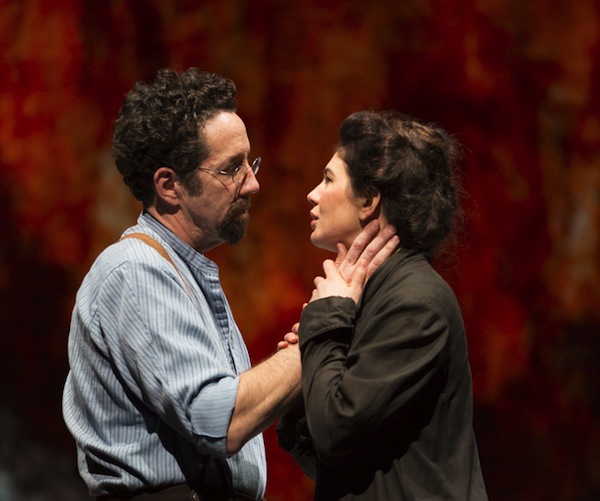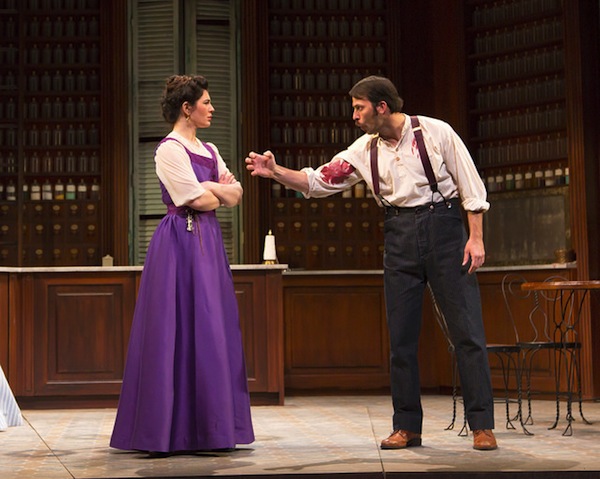Theater Review: “Becoming Cuba” — A Sugary Historical Melodrama
Dramatist Melinda Lopez’s “Becoming Cuba” holds your attention even after you see just where it is going and why.

Christopher Tarjan (Davis) and Christina Pumariega (Adela) in the HTC production of “Becoming Cuba.” Photo: T. Charles Erickson.
Becoming Cuba, by Melinda Lopez. Directed by M. Bevin O’Gara. Staged by the Huntington Theatre Company at the Calderwood Pavilion at the Boston Center for the Arts, Boston, MA, through May 3.
By Bill Marx
Narratives about characters who have to choose between neutrality and activism in times of violent crisis tend to take one of two routes: the inspirational and the tragic. In the classic ’40s film Casablanca, the cynical Rick must rekindle his love for Ilsa and jettison his petty egotism before he can do battle against the Nazis. In Bertolt Brecht’s 1939 masterpiece Mother Courage and Her Children, the title character does everything she can to stay above the bloody fray for the sake of her canteen business: she survives the chaos, but loses her family and soul in the process. The first approach asks, when will he or she take sides? The other radically questions the very notion of moral choice when surrounded by brutality.
Melinda Lopez’s surprisingly old-fashioned historical drama Becoming Cuba is set during the Cuban War of Independence, and it starts out with its commanding female protagonist, Adela, taking a refreshingly disinterested view of the turmoil around her. The highly competent owner of an apothecary shop, she has remained above the turmoil by serving the needs of both the Spanish oppressors and the Cuban rebels, even though (or perhaps because) she has intensely personal ties to both camps. Her critique of the underdog guerrillas, who have instigated a scorched earth policy, and the barbaric response of the Spanish military is astute. She is also wised up to how the Americans, waiting in the wings for a chance to invade, are as interested in controlling Cuban commerce as they are in helping the people achieve freedom. The scene is set for a ambitious drama examining how an individual fares in the shifting quicksands of war and delusional rhetoric.
But instead of diagnosing Cuba’s evolution (and our contemporary ideas about commitment) the play works over its strong-minded heroine. Over the course of the evening Adela’s head and heart is changed, assisted by Davis, an earnest-to-a-fault American reporter, her half-brother Manny, who testifies to the unshakable courage of the rebels, and her impulsively passionate younger sister Martina, who is injured. Of course, Adela overcomes the traumas of her past. Once romance and healing arrive the play resolves all-too-neatly into the Hollywood version of taking-to-the-barricades, capped by the scene-stealing appearance of a villain who appears to be capable of eating babies.
In an interview, Lopez says that Becoming Cuba was partly inspired by the events of the Arab Spring. Brecht’s script was shaped by the rise of Nazism and Fascism leading up to World War II. Given the outcome of recent efforts at reform in the Middle East, it would seem that contemporary history bears out Brecht’s sharper view of the limits of humanity. But tragedy, especially when it comes to matters political, is not often found on major American stages, which are about uplifting audiences rather than making them think. Like Rick, Adela is inevitably going to choose sides and we are going to admire her empowered self for doing it. She even has a lover waiting for her once she takes her leap of faith.
Lopez seems to be aware that the conventional romance tropes do a disservice to the viciousness of history, and she tosses in a quartet of sardonic interludes in which mythic figures (the Conquistador, for example) strut and joke about the exploitation and violent mistreatment of the Cuban people over the centuries. That kind of unmerciful lampooning has to be done with a scathing wit driven by a pitiless sense of absurdity: here the effect comes off as broad and self-conscious, the humor strained at times. The same kind of uncertainty of tone afflicts other parts of Becoming Cuba, which veers uncertainly from the serious to the comic: even when deadly violence is seething outside of the shop there is still time for amiable flirtation.
All this said, Becoming Cuba holds your attention even after you see just where it is going and why. Partly this is because of the pleasures of melodrama, in this case a re-telling of Casablanca with a woman, rather than a man, discovering that moving forward means embracing a besieged cause (and an identity) rather then holding onto the bad old stale past. (In plays like this history is made to be discarded, like excessive baggage.) Lopez creates characters and interactions with a comfortable aplomb, especially the give and take between Adela and her sister, which has the right sprightly, competitive rhythms. Alas, she has come down with a bad habit shared by many of our current playwrights, who feel that they cannot trust audiences to figure things out for themselves. Thus late in the play we have a newly committed-to-the-cause Martina calling Adela “hollow.” You go girl!

Christina Pumariega (Adela) and Juan Javier Cardenas (Manny) in the HTC production of “Becoming Cuba.” Photo: T. Charles Erickson
The Huntington Theatre Company production, under M. Bevin O’Gara’s straightforward direction, is generally involving, especially Christian Pumariega’s impressively cool Adela — she adroitly shows how the woman dispassionately calibrates the askew angles, at least until the character’s brain crumbles under the weight of the plot. Rebecca Soler as Martina, Marianna Bassham as the beleagured wife of a Spanish ogre, and Juan Javier Cardenas as Manny manage to instill some energetic life into what could have been stereotypes, while Christopher Burns obviously relishes his flashy opportunity to spit evil as one of the Spanish butchers. Cameron Anderson’s set, with its towering shelves of bottles, provides a powerful image of captivity, though the colorful closing moments of liberation feel like a greeting card cliche.
As the American reporter, Davis, Christopher Tarjan has the challenge of playing a well-meaning scribbler on the Cuban conflict beat, apparently one of the few ink-stained galoots who has managed to maintain his idealism in the sickly Golden Age of Yellow Journalism. In 1898, the great Stephen Crane was in Cuba reporting on the adventures of the Rough Riders. He was there partly because the author of The Red Badge of Courage liked putting himself in death-defying situations. Here is a bit of what Crane sent back for the consumption of his countrymen about the Cubans:
As a matter of fact, the Cuban soldier, ignorant as only such isolation as has been his can make him, does not appreciate the ethics of the situation.
This great American army he views as he views the sky, the sea, the air; it is a natural and most happy phenomenon. He will go to sleep while this flood drowns the Spaniards.
The American soldier, however, thinks of himself often as a disinterested benefactor, and he would like the Cubans to play up to the ideal now and then. His attitude is mighty human. He does not really want to be thanked, and yet the total absence of anything like gratitude makes him furious. He is furious, too, because the Cubans apparently consider themselves under no obligation to take part in an engagement; because the Cubans will stay at the rear and collect haversacks, blankets, coats, and shelter tents dropped by our troops.
Compared to Crane’s condescension, Davis’s puppy dog admiration comes off as a sop for audience delectation, a mask for American rapacity. Could it be that the pumped-up inspirational ending is an attempt to disguise the fact that, despite her change of heart, Adela remains an accomplice to Empire?
Bill Marx is the Editor-in-Chief of The Arts Fuse. For over three decades, he has written about arts and culture for print, broadcast, and online. He has regularly reviewed theater for National Public Radio Station WBUR and The Boston Globe. He created and edited WBUR Online Arts, a cultural webzine that in 2004 won an Online Journalism Award for Specialty Journalism. In 2007 he created The Arts Fuse, an online magazine dedicated to covering arts and culture in Boston and throughout New England.
Tagged: Becoming Cuba, Huntington-Theatre-Company, M. Bevin O'Gara

After seeing Becoming Cuba I think Bill Marx was generous in his review. I wish Lopez had told her appealingly old-fashioned story straighter without the historical figures that set each scene. She didn’t need them and they took away from the trajectory of the play. And I wish she had used the apothecary metaphor of healing and retreat more effectively both in her shaping of the character of Adela and Adela’s relationship to the outer world. She almost got there with Martina towards the end of the play, but I felt that was too late, too little and she had missed a wonderful opportunity which would have helped her and us understand Adela better.
For me, the problem is that dramatist Melinda Lopez attempts to cram complex political/personal conflicts into a romantic ‘feminist empowerment’ mold — turning what could have been a bitterly revelatory story into a neatly inspiring entertainment geared to leave audiences content rather than provoked. (The musical Witness Uganda at the A.R.T. was of the same simple-minded ilk.) Thus the ridiculously ‘up’ ending, where our heroine meets her American lover to fight for the Revolution. That is why I put in the Stephen Crane quotation. The truth is, Adela is swapping one brutal empire for another — nothing to celebrate there. But there is no irony in the ending — because the romance approach does not accommodate irony.